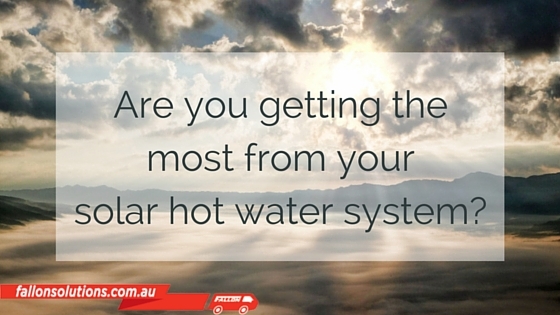6 March 2018
Are you getting the most from your solar hot water system?
Moving from an electric or gas to a solar hot water system can take some adjustments. However, with a slight shift in the way you think about water heating and a few small changes to your daily routine you can reap significant economic rewards.
Due to the ample sunlight, the area receives for most of the year a solar hot water system installed in a south-east Queensland home has the capacity to provide 86-95% of a home’s annual hot water needs. So even with 5-14% of heating being reliant on the booster a household switching from gas or electric hot water should see a significant reduction in power costs.
Despite this many residents report mediocre power savings from their solar hot water systems, this could be the result of many issues ranging from incorrect installation to misunderstanding of how the system works.
Incorrect installation
A 2010 study into the performance of residential solar hot water systems found that an alarming number of households reviewed had performance issues that stemmed from incorrect or insufficient installation. Some of the problems were contributed to the lack of experience with solar hot water systems by the installing plumber, other issues such as inadequate insulation could be due to corner-cutting by installers.
Lack of knowledge about the system
Misunderstanding of how solar hot water works has kept many households from fully taking advantage of their systems. Unlike other styles of hot water heating solar is not a set and forget setup, well not if you want to make the most of its power and greenhouse gas reducing capabilities. Utilizing features such as the manual control of the booster enables users to further reduce power consumption.
Get the most from your solar hot water system
Each individual household’s hot water needs can differ greatly so get professional advice to ensure you’re not struggling with a system that is too small or running a huge hot water heater you don’t use. Also:
- manually turn the booster on and off when you need it rather than leaving it on automatic
- consider adjusting your daily routine to place the bulk of the hot water use at the end of the day when there is the most solar-heated hot water
- ensure that the hot water pipes are properly insulated. You could be losing significant amounts of heat due to insufficiently insulated pipes.
- regularly trim tree growth around the collector panels or evacuated tubes to allow for maximum sun exposure. This is especially important during winter when the sun is lower in the sky.
- a periodic clean with warm water and a soft cloth, if you are in a dusty environment or live near a major road, will help the system to continue to perform at its best. Can’t get to the solar collector? Hire a professional solar panel cleaner.
If the solar hot water system installed in your home is falling short of your expectations getting it checked over by an experienced solar hot water plumber could identify any issues with the installation or setup. Your plumber can also provide expert advice on making the most of the hot water heater features.
References: http://eprints.qut.edu.au/38550/1/c38550.pdf, Building Codes QLD 2008
Related hot water system posts
Internal instant hot water systems – perfect for small homes and apartments
Suggested articles
No articles found









